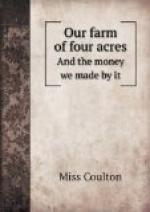During this time the fire must be lighted in the oven with fagots, and the heat well maintained till the bread is ready to enter it. At the end of the half-hour add four quarts of water, of the same heat as the previous two quarts, and well knead the whole mass into a smooth dough. This is hard work, and requires strength to do it properly.
It must be again covered and left for one hour. In cold weather both sponge and dough must be placed on the kitchen-hearth, or it will not rise well.
Before the last water is put in, two table-spoonfuls of salt must be sprinkled over the flour.
Sometimes the flour will absorb another pint of water.
When the dough has risen, it must be made up into loaves as quickly as possible; if much handled then, the bread will be heavy.
It will require an hour and an half to bake it, if made into four-pound loaves.
While the dough is rising the oven must be emptied of the fire, the ashes swept from it, and then well wiped with a damp mop kept for the purpose. To ascertain if it is sufficiently heated, throw a little flour into it, and if it brown directly, it will do.
I think I have stated every particular necessary to enable a novice to make a “batch” of good bread. I will sum up the articles requisite to produce forty-two pounds of the best quality:
Flour, 28 pounds.
Water at 100’, 12 or 13 pints.
Two table-spoonfuls of salt.
Yeast, 1 pint.
Bake one hour
and a half.
The quantity made was ten and a half quarterns, or four-pound loaves; and, as I have said, supplied our family of thirteen persons for the week. For the same number, when we were residing in town, the baker used to leave thirteen quarterns weekly.
One day, in the country, when, from the accidental absence of the bread-maker, we had to be supplied from the baker, we were surprised to hear that at the nursery-breakfast the children (six) and nurse consumed more than a two-pound loaf, and then were complaining of being “so hungry” two hours after. I thought of the words of the Kentish hopper, “that there was no heart in bakers’ bread.”
The servant who has the management of the oven should be instructed to take care that the wood-ashes are not thrown into the dust-hole with the ashes from the grates. They are always valuable in the country; and, as I have mentioned, the wooden articles used in the dairy should always be scrubbed with them. Should the water which is used in the house be hard, and any washing done at home, they should be place in a coarse cloth over a tub, and water poured over them several times to make lye, which softens the water, and saves soap much more than soda, and is likewise better for the linen.
The brick oven will often prove a source of great convenience, independent of bread-making. It is just the size to bake hams or roasting pigs, and will, when dinner-parties are given, frequently prove much more useful to the cook than an extra fire.




